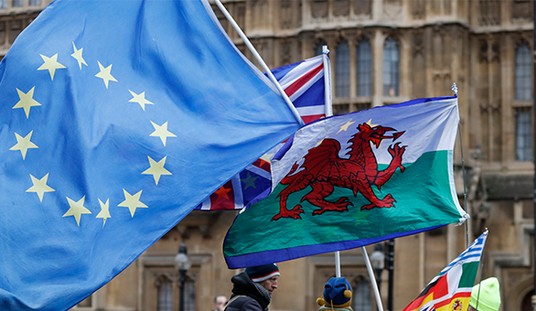Kirsten Gillibrand finally has her One Big Idea to feature on her presidential campaign — and it’s all about getting money back to the, er, politicians. In an interview on NBC News, Gillibrand unveiled her “Clean Elections Plan” to reduce the influence of wealth on politics. The key feature of this will be “Democracy Dollars” — vouchers from the government to spend on political candidates:
Sen. Kirsten Gillibrand, D-N.Y., unveiled a plan on Wednesday to give every voter up to $600 in what she calls “Democracy Dollars” that they can donate to federal candidates for office. …
Under Gillibrand’s plan, every eligible voter could register for vouchers to donate up to $100 in a primary election and $100 in a general election each cycle, either all at once or in $10 increments to one or more candidates over time. Each participant would get a separate $200 pool for House, Senate and presidential contests for a total maximum donation of $600 for those federal offices.
What a great idea! Taxpayers overwhelmingly worry about whether politicians have enough access to their tax dollars. They have no desire to get $600 of those tax dollars back into their own pockets to spend on themselves. For all the moaning over money in politics that comes from people forced to do fundraisers, voters rarely if ever list it among their policy priorities. Usually, their top concern is the economy, by which they mean their economy and not the economy of politicians.
It’s tough to see what this does other than subsidize the first $600 of political donations from people inclined to make them. Considering the rules that Gillibrand proposes, it might not even do that much:
There would be strings attached for both donors and candidates. The money could go only to elections in the donor’s state, although they could be used for House candidates outside the voter’s district.
Politicians would face much tighter limits on donations. To be eligible to receive “Democracy Dollars,” a candidate would have to voluntarily agree to forgo any contributions larger than $200 per donor. That’s a big drop from the current maximum of $2,800 per primary cycle and $2,800 for the general election.
What would stop Warren Buffet from spending $600 in “Democracy Dollars,” and then $6 million on other politicos, PACs, and thieves, if readers will pardon a Cher reference? Nothing, apparently, which means we’re not getting wealth out of politics. It means we’re converting some wealth into public campaign subsidies by laundering it through taxpayers who are otherwise disinclined to contribute.
Even apart from that, though, why would any candidate agree to these conditions?Gillibrand laughably claims in her interview that the limits on this system mean candidates could raise “exponentially higher” sums of money, but that’s nonsensical on its face. They’re far more restrictive than the donor limits imposed on presidential candidates that Barack Obama infamously eschewed when he realized he could raise many times those limits in 2008. You’d have to get fourteen times as many donors as those who would otherwise max out to your campaigns, let alone all the other levels between $200 and $2800.
So where will the money come from to fund “Democracy Dollars”? Gillibrand plans to pay for this scheme by getting rid of a corporate deduction for executive compensation, meaning that corporate money will still be getting used indirectly in elections. Gillibrand estimates that this will raise about the same amount of money per year as we spend on national elections — roughly $6 billion, or less than we spend on Halloween in an average year. That’s only going to be true until corporations rethink executive compensation to deal with the tax change, though, much like they did with Bill Clinton’s tax plan that allowed Amazon to pay zero federal income tax last year.
“Democracy dollars” are a laughably self-absorbed money-laundering mechanism to raid the federal treasury for political campaigning. It imposes more artificial limits and complexity to a system that’s getting corrupted because of those artificial limits and complexities, not in spite of them. If we want corruption out of the system, make all donations to candidates and PACs above $200 instantly transparent and searchable, and evaluate candidates on the money they raise.
This wasn’t even the most pathetic product from Team Gillibrand this week on campaign fundraising. Enjoy the Beer Water Pong Challenge.
We need 65,000 individual donors to secure a spot on the debate stage. If you chip in $1, you can help get us there. https://t.co/ZcY6NSp1gS pic.twitter.com/2GwXs6pYWe
— Kirsten Gillibrand (@SenGillibrand) April 30, 2019








Join the conversation as a VIP Member